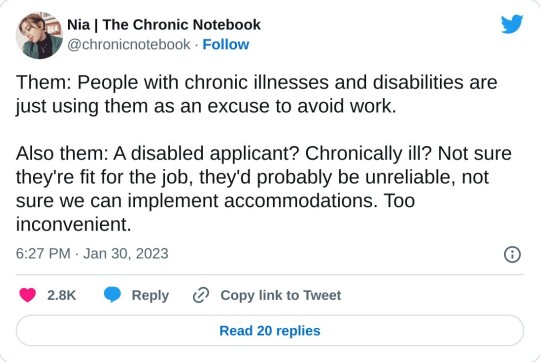Don't wanna be here? Send us removal request.
Text
Just found out that the dietary calorie is still measured by burning food in a "bomb calorimeter" and then measuring the heat produced. There's no solid evidence that this method is at all equivalent to how our bodies process food (an entirely different chemical process from combustion), the accuracy of this system has been disputed for as long as it's existed, and there are no available alternatives
There are 4800 calories in a kilogram of dry sawdust even though wood is completely indigestible to humans, because calories don't measure nutritional value, just how well something burns
Nutritional "science" is pure bullshit
46K notes
·
View notes
Text
Kallitsounaki and Williams found that transgender participants did in fact report alexithymia symptoms at an elevated rate, compared to their cisgender peers. This effect also held strong when eliminating all Autistic participants from analyses, which indicates that even non-Autistic transgender people are worse at naming and recognizing their feelings than non-Autistic cisgender people are. The study’s authors concluded from these findings that non-Autistic transgender people appear to exhibit “subclinical” Autistic traits. “Future studies mighty usefully examine whether alexithymia is a potential “marker” of autistic traits in transgender people who do not meet full criteria for autism,” they write. To put it another way, they believe the alexithymia that non-Autistic trans people report is still caused by (mild) Autism. But this conclusion carries with it a faulty and as-yet untested assumption: that alexithymia must be caused by Autism directly, when in reality it could just be a natural consequence of living in a marginalized and othered body. Just because a transgender person struggles to name and recognize their emotions doesn’t necessarily mean they’re Autistic. It could very well be the case that both Autistic people and transgender people struggle to understand our feelings, because we have experienced a lifetime of questioning and invalidation. And if we look to the broader research literature on alexithymia, we see even more evidence that this might be the case. … It’s not just Autistic people who have been found by researchers to experience alexithymia. Sufferers of trichotillomania, or compulsive hair-pulling, have repeatedly been found to be alexithymic too. Some research also links alexithymia with early exposures to trauma and abuse. People who do not know they are pregnant (also known in the literature as pregnancy-deniers) tend to be alexithymic, for instance. They also tend to be victims of childhood sexual assault. These two things are not unrelated. We know that when vulnerable people (particularly children) are sexually assaulted, their minds tend to dissociate from that upsetting reality. Their consciousness “floats away” to a point elsewhere in the room, or they pretend the abuse isn’t happening to them or that the world around them is not real. Additional research has also found that alexithymia is associated with early childhood abuse, especially emotional and physical neglect. It makes sense that a mind that’s well practiced in the art of detachment might stop checking on its internal states entirely. A body that has often been the site of your abuse is one you can’t dwell in comfortably. If you can’t count on your caregiver to provide you with regular nourishment, there’s little reason to make note of your own feelings of hunger. And if your cries for help or comfort are never heard with sympathy, you may quickly learn not to even recognize sadness within yourself at all. These findings also dovetail with an observation that Kallitsounaki and Williams make in their paper, but don’t take much time to dwell on: they found that the cisgender men in their sample were significantly more alexithymic than cisgender women. This finding also suggests that there are environmental and social factors that contribute to a person’s awareness of their own emotions — and populations that are discouraged from sharing how they feel are far worse at understanding their feelings as a result.
Women aren’t innately more attuned to emotions than men are. They’re simply expected to be more emotionally aware, and given more tools to make emotional recognition and expression possible. Men, on the flip side, are denied the freedom to be openly emotional, and also relieved of the responsibility to look after their own or others’ feelings. This results in them understanding emotions a whole lot less. If we can’t assume that the alexithymia of men is innate, then we shouldn’t assume it’s innate in Autistics or transgender people either. For just as men are discouraged from openly crying, asking for help, or showing other signs of supposed “weakness,” both transgender people and Autistics are actively discouraged from expressing discomfort or seeking emotional aid for ourselves.
read the rest of the article for free here.
1K notes
·
View notes
Text
1K notes
·
View notes
Text
Ok I'm rather busy and had planned to write a longer post elaborating on this topic but I can't do it now, I'll probably still write one later but I wanted to make a short post as the topic has become relevant: the thing that you have to know about my writing style is that (speaking particularly about my serious posts here and not my shitposts) it is very literal modulo certain stylistic quirks. I don't really have time to elaborate all of these (ironically this post was written in a rush, and thus might not itself be the best example of my usual style), but one important fact is that when I say "almost", "in generally", "more-or-less", "in some sense" and so on, I really mean these. Like, these aren't filler words, I think a lot of people just gloss over them but tbh I often agonize over where exactly to put these when writing a post. I sometimes leave posts in my drafts for ages just because I haven't decided whether to propose some phrase with "generally" or not. I'm very, like, careful about trying to make it unambiguous that I don't mean whatever I don't mean, right? So these words are not meant to be glossed over; they're written carefully and they're meant to be read carefully.
It's also important to note that I omit them for stylistic reasons quite often, in particular because if I included words like this everywhere that I think they should logically be, my writing would become like, unreadable. So I try to structure things whereby I set the reader up with reasonable assumptions about what generalizations are absolute, which ones are statistical but high confidence, which ones are very loose and so on. So for instance I'll often set up the appropriate way of understanding a generalization in the first paragraph in which it is introduced, and then make it clear from context that the reader should carry this through when I talk about it going forward. Maybe I don't always do a good job.
But like, consider this recent post. I first say that "I’m comfortable taking it almost as an axiom that no one should ever get kicked out of where they are living". And when I say almost, you know, I mean almost! Idk if other people's writing has this quality. Almost is not there for metrical shape, it's there for content! Anyway, later say something like "an ideal housing policy should respect this axiom", and this is meant to mean... well, I'm not sure really how to say it other than how I said it, it's meant to mean "an ideal housing policy should respect this axiom". A very important part of the semantics of this sentence is that I am invoking a sort of fundamental property of ideals, which is that you usually can't achieve them in actual practice but you should try to get close, modulo whatever constraints you are under. Maybe it's not clear that these constraints are the same constraints imposing exceptions to the axiom; that seems like a genuine ambiguity. Well that's on me.
Anyway, this post sounds kinda snarky like I'm getting on people's case for not reading my post correctly, but no that's not what I mean at all! No like, I'm not irritated at other for not reading a post how I intended it. But I've been wanting to write about my own writing style for a while, in particular because as I said I write in a very particular way whose meaning may not always be like... obvious to readers. And this was a good opportunity to like, point out one of the biggest ways in which my writing style is particular, and which sometimes leads to misunderstanding. Well anyway. Sorry this was written in a rush cause I have actual things I have to do today, there's probably typos and so on so please forgive that.
46 notes
·
View notes
Text
my dear babies who grew up with undiagnosed adhd who are now medicated adults and still struggling, this ones for you.
let me give you a cute tip ok? ready?
you don't have to do things as fast as possible
ok i know that this is jarring to read, but stay with me. you may be having the realization at this very moment that every single task that you have ever undertaken in your life, your goal was to complete it as quickly as you possibly could. and maybe you're medicated now or maybe you aren't. but this has always been your philosophy.
this is not actually necessary and not how neurotypical people view things like tasks or responsibilities
a real life example of how this information has changed the way that i behave and has had a positive effect on my mental health:
i noticed that when getting ready to take my dog for a walk, my primary goal has always been to get the harness and leash on her and get out the door as quickly as i can. for no reason other than i was lead to believe as a kid that faster = efficient = better. however, there are other factors, such as: i sweat very easily and moving around at a fast pace trying to collect all of the things i need to rush out the door exacerbates this. these combination of factors results in me getting highly irritable and overstimulated.
i later realized that this is the way that i get ready to leave the house no matter what i am doing
now, when i am getting ready to take my dog for a walk, i purposefully do everything at half speed. i gather stuff slower. i move through the house slower. i put the harness on slower. i clip the leash slower. i open the door slower. i make a conscious effort to do everything almost in a way that feels like slow motion to me.
and you know what? applying this behavior to almost every single task or activity that i have to do results in me having a significant magnitude less anxiety than if i am in my usual "do this task as if you are racing against an invisible clock" state of mind.
the old saying "slow down to speed up" is quite poignant when it comes to dealing with neurodivergency, especially adhd. even if you're medicated, you may still be consistently making mistakes because you're probably still moving with a level of urgency that is unwarranted. you're not in a race. it's ok to do things using inefficient methods, especially if it is a benefit to your mental well-being.
6K notes
·
View notes
Text
literally every day on here I’ll see posts that go “how dare you assign a group as being ontologically evil, you should never do that because that means you’re a member of a different group that is ontologically evil”
61 notes
·
View notes
Text
all queer history on here is just US-American or maybe sometimes some UK history as well and it makes me sad that there’s so little information about other countries’ queer history on here :(
114K notes
·
View notes
Text
concept: a person has a severe nervous breakdown, locks themselves in their room, blocks out the windows, & draws several large artworks on the walls that are expressions of their anguish. what they don’t realize, due to sufficient self-censorship of their own self-awareness, is that they are modeling this event after Francisco Goya’s creation of his Black Paintings, & this modeling stems from a buried desire to see themselves artistically expressing their anguish in a manner as private & sincere as Goya himself, who didn’t have himself to read about & model himself on, & indeed never spoke of the paintings. try as this person might, though, they cannot unread what they’ve read about Goya. they’re inevitably executing a pre-written “story” &, in a repressed way, do hope & expect for it to find an audience eventually in the same way the Black Paintings did. so the “unhinged” aspect of their breakdown is not so much the dramatic seclusion & creation of the art as much as it is the desperate succumbing to that act of modeling out of a desire to see their grief externalized in a way that they understand & would like to see
3K notes
·
View notes
Text
I have to remember every 5 years that when I was a little kid my dad was having obsessive spirals about things he did wrong like 30 years prior and his talked to his therapist about it and you know what they did NOT say. They did not say "hmmm well have you learned your lesson changed your behavior and atoned?"
They said "that sounds like a really unhelpful and distressing thing that your brain is making you think about All The Time. How about when that happens you try to think about something that makes you happy instead"
(My dad carried a picture of me at age 4 with a large inflatable dinosaur in his wallet for this purpose) (hard to ruminate about past failures when looking at a picture of your kid enjoying a large inflatable dinosaur)
Anyway. Fucking... stop thinking you can Solve Ethics by spiraling you fool. It's the Ethics Cuckoo. Fuck that guy
47K notes
·
View notes
Text
About ten years ago I decided that the next step I needed to take in my life was to accept and explore what it meant to be a failure and to have failed. This infuriated almost everybody in my life and clearly terrified a lot of people. People do not want you to accept failure. They dont want you to like... Sit with and think about it and pick it up and turn it arpund in your hands and really examine it. They want you to keep throwing yourself against the impossible walls until your body explodes! They do not want you to say "alright then, I've failed. What does that mean for me? Im still here. What does the life of someone who has failed look like?"
This makes people very angry and panicky.
My mental health improved in ways it had not in the previous DECADE once I stopped. And. Sat. With failure. And thought about what my failure ... Was. And looked at the structures that produced it and examined them critically.
It is so taboo to fail and admit it openly and talk about it. It is so taboo to talk about or think about failure in an accepting way rather than hiding it shamefully until you experience a degree of success in some area which allows you to present the past failure as "a stepping stone" to your current situation. Fuck that. We are put in positions of guaranteed failure by society every day and then punished and shamed for it. Lets fucking talk about failure
85K notes
·
View notes
Text
just saw a chart with the gender options "male" "female" and "part-time/other" and i think i get what they were going for but i'm obsessed with the concept of part-time gender. clocking into my shift at the gender factory and brother i am not getting paid a living wage
63K notes
·
View notes
Text

Some of my SANDMAN commissions. Above, Sandman and Thessaly, though if memory serves, this was actually done for a 25th anniversary SANDMAN exhibit.

Death and Delirium. Private commission in pencil.

DEATH cover sketch commission.

Destiny. Brush and ink on mulberry paper, I think. Can't recall.

Lucifer. Brush and ink.

Sandman. Brush and ink on antique paper.

Sandman. Brush and ink.

Death and Dream. Brush and ink.
3K notes
·
View notes
Text
Unfortunately lizard brain has decided that my inescapable-but safe-living situation is unsafe. So I have been panic looping for weeks and can’t convince myself to deal with the higher stuff. Gah.
upset and don’t know why? Appease the Brains
lizard brain
questions: do i have food, water, and safe shelter?
solutions: drink more water. drink things with electrolytes. make and stick to a food schedule that works for you. clean your room. if you are in an unsafe situation, talk to someone trusted about creating a plan to get out
toddler brain
questions: have i had enough rest? am i been getting what i need to be healthy? am i cared for? am i frustrated?
solutions: make sure you’re getting enough sleep on a schedule that works for you (people naturally sleep better at different times and need different amounts of sleep. if youre young you will need to sleep more than 7 or 8 hours). make sure you have varied nutrition in your diet. make sure your medications and supplements are working for you and take them on schedule. work on developing a support system that meets your needs. take breaks from things if you feel burned out, even if it’s only for a day
monkey brain
questions: have i had enrichment in my life? am i stuck in a rut? have i had socialization, entertainment, and creativity? has anything challenged me lately?
solutions: limit your time on social media. make an effort to be in new environments - even if its another room in your house or backyard. examine what is or isn’t working in your routine. pick up a new hobby (if you’re more physically active, consider a hobby like writing or coding. if you’re more mentally active, consider a hobby like woodworking, bookbinding, or a sport). write stories, make art, and write analyses (if you haven’t tried original work - focus on that for a little while). try new music. try a new food. build something with legos. consume a new type of media even if you’re not sure you’ll like it (like graphic novels, radio plays, or watching ballet). take on a long term project and set aside time to work on it on a schedule (whether its every day, every few days, or specific days each week)
human brain
questions: do i feel loved? do i feel understood? am i existentially fulfilled? do i have a sense of purpose? do i have a sense of meaning? am i contributing to the lives of the people i care about and are they doing the same for me in return?
solutions: reach out to friends and loved ones, and do activities together, like play a game online or walk in the park. talk to safe people about things that upset you, such as a trusted friend or a therapist, and find steps to improve your mental health. interrogate whether your religious beliefs are working for you, and if they are, make an effort to practice your faith, whether that is attending services (including digitally if they have them), reading and discussing your religious texts, or following holidays. read self help books or blogs from trusted professionals. read about philosophy and interrogate your own understanding of things. learn how to communicate your needs, thoughts, and desires to people who will listen. be active in your community (whether in community service, activism, or getting involved in local politics). adopt a rescue animal. give money to causes you care about. make an effort to learn about points of view and lived experiences that are different than your own. challenge assumptions about how you are expected to live your life and decide whether you want those things or not. express love for the people you care about - through kind words, good acts, crafts, or otherwise. if there are steps in your life you have been afraid of taking, make a plan to take them
if you fulfill higher needs before lower needs, you will still feel bad. if you feel bad and don’t know why, start lower and work your way up. basic needs must be met before moving on healthily
24K notes
·
View notes
Text


Shame on America and shame on most of Europe for abstaining
Especially the UK, Ireland, France and Germany
18K notes
·
View notes
Text
J. R. R. Tolkien, undisputedly a most fluent speaker of this language, was criticized in his day for indulging his juvenile whim of writing fantasy, which was then considered—as it still is in many quarters— an inferior form of literature and disdained as mere “escapism.” “Of course it is escapist,” he cried. “That is its glory! When a soldier is a prisoner of war it is his duty to escape—and take as many with him as he can.” He went on to explain, “The moneylenders, the knownothings, the authoritarians have us all in prison; if we value the freedom of the mind and soul, if we’re partisans of liberty, then it’s our plain duty to escape, and to take as many people with us as possible."
Stephen R. Lawhead
54K notes
·
View notes


